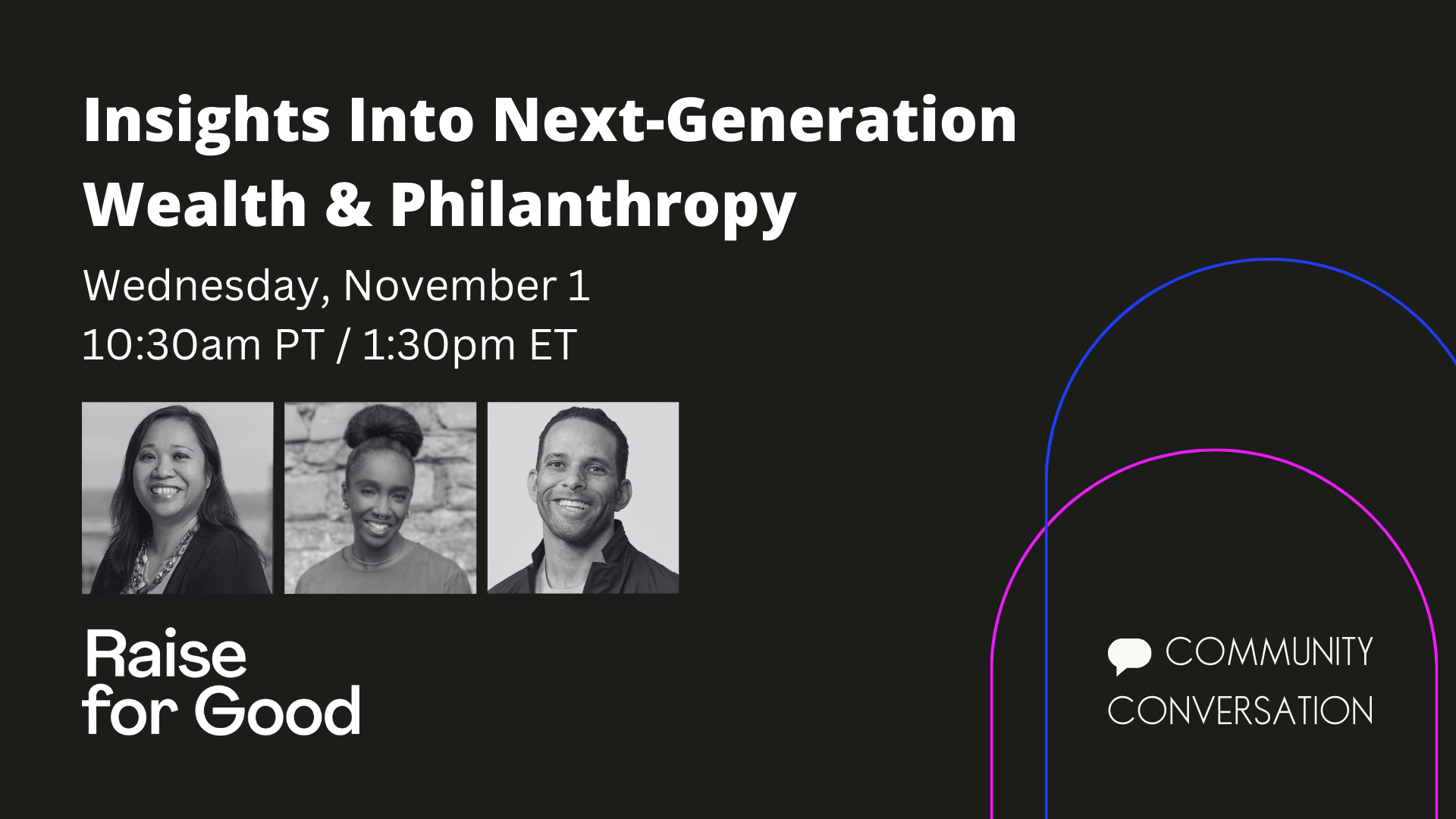
We are currently undergoing the largest wealth transfer in history with trillions of dollars moving from the Boomer and Silent Generations to the younger generations. Engaging this next generation is a crucial step to accelerate short-term impact and lay the foundation for sustainable, lasting change. This event was an exciting opportunity to bring diverse perspectives together to explore new and innovative approaches to giving and spark a collective shift that can shape the future of philanthropy for the better.
Our amazing speakers -
Moderator: Elaine Chu, VP Philanthropic Strategies, Private Donor Group, Fidelity Charitable
Nwamaka Agbo, CEO & Managing Director of the Restorative Economies Fund, Kataly Foundation
Ryan Nece, Managing Partner, Next Legacy Partners
Event Recap
Our speakers discussed their experiences and strategies for engaging the next generation of wealth holders in the transition towards more collaborative and impactful giving. They underscored the importance of centering people and relationships, trust and community voices, innovation and experimentation, and sustainability.
People and Relationships
Curiosity, deep connection, and diverse perspectives are vital to fostering meaningful and sustainable change. To draw a sports analogy, it’s akin to bringing the right people into your “huddle.” Identifying and incorporating other individuals and organizations into this huddle enables mutual learning, empowering us to make more informed and impactful decisions. To truly deepen our impact in philanthropy, we must approach our work with curiosity, acknowledging the gaps in our information and building deep enough relationships with organizations on the ground such that they will tell us what they need and we can show up for them and fund them accordingly.
Trust and Community Voices
Trust and accountability form the bedrock of community empowerment. Community voices and building trust empowers the people most affected by the issues to be part of the solutions. Funders seeking to build trust and work effectively with organizations should be prepared to make substantial, multi-year general operating support grants to those organizations. This not only removes the burden of constantly seeking funding but also allows for more honest and in-depth conversations about the needs and challenges of the community. By demonstrating this commitment, funders can foster stronger relationships with grantees and gain a deeper understanding of the complex issues affecting the communities they support, ultimately leading to more effective and impactful resource allocation. Funders should focus on resourcing communities to build their own power, enabling them to lead self-determined lives and achieve sovereignty.
In addition, it’s important that funders and board members engage in a continuous process of self-reflection and growth, particularly around their understanding of privilege, power, and their role in philanthropy. This self-awareness and commitment to change not only facilitate more effective resource allocation but also enable the organization's staff to focus on supporting community initiatives instead of trying to convince leadership of the importance of funding neglected communities. Individuals and institutions must take dual action on critically examining their access to wealth and privilege while actively working to reshape the conditions that impact the communities they aim to support.
Innovation + Experimentation
The next generation of philanthropy should not only introduce new models but also focus on innovative and sustainable approaches. It's crucial to gain a deep understanding of the challenges faced by nonprofit organizations and the complexities of achieving lasting, large-scale change. The spend-out and venture models stand out as innovative approaches, providing grassroots organizations with the necessary resources to expand their efforts. However, there is a need to continually seek improvement and innovation in philanthropy, acknowledging that there is no perfect, but there is always better. In this quest for more effective and impactful philanthropy, it's important to view philanthropic models simply as tools, and make creative use of them to maximize community benefit, actively challenging systems that may neglect marginalized communities.
Sustainability
While passion and urgency are vital drivers for philanthropic action, there's a need for taking a more sustainable and enduring approach. To illustrate: instead of being like a helicopter that goes up and down quickly, individuals should adopt a 747 approach—taking off, reaching a stable cruising altitude, and maintaining that level of impact over the long term. In essence, philanthropists should balance the hunger for immediate change with a commitment to best practices and lasting, impactful philanthropy.
